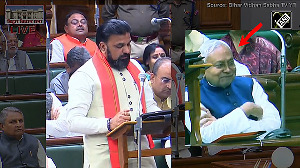The Reserve Bank of India on Monday said inflationary pressures because of oil and food prices are likely to continue, giving an indication that monetary policy could be tightened further when it comes for review on Tuesday.
"As the potential inflationary pressures from international food and energy prices appear to have amplified and, by current indications, are likely to remain so for some time," the RBI said in its review of Macro and Monetary Development for the first quarter of the current fiscal.
The Reserve Bank further said that international crude oil prices are likely to remain high in view of the relatively tight demand-supply position.
The central bank said the recent increase in petroleum prices by the government was not sufficient in view of the rising global crude oil prices.
"This suggests that the pass-through in case of administered petroleum products is still incomplete," it said. Referring to growth prospects, the Reserve Bank said sharp deceleration in electricity and subdued performance of petroleum refinery sectors are impacting the infrastructure growth.
Credit off-take to commercial sector, however, grew by 24 per cent as on July 4 compared to 26 per cent in the same period a year-ago, the central bank said.
The electricity sector, it said, slowed down mainly on account of decline in nuclear and hydro electric generation and lower plant load factor in thermal power plants.
In the services sector the deceleration in growth was witnessed in financing, insurance, real estate and construction and business services sectors, RBI said.
The apex bank further added that Indian economy continued to be driven by the domestic demand with consumption accounting for more than two-thirds and investment little less than one-third of real GDP.
The business expectation indices for April-June and expectations for July-September declined by 5.4 per cent and 0.9 per cent year-on-year, the Reserve Bank said quoting its industrial outlook survey of private manufacturing companies.
"Most of the corporates expect an increase in raw material prices and the increased production cost is expected to be adjusted by keeping inventory levels at below average and by raising selling prices," the central bank said.
Even though global financial markets came under stress again in June, this sector remained orderly in India.
The review pointed out that interest rates in the money market mostly remained within the range set by repo and reverse repo during the quarter.
Due to rise in interest rates, yields in the government securities hardened during the first quarter.
The liquidity conditions eased during the first week of July, mainly on account of a decline in cash balances of central government, but tightened thereafter mainly due to two-stage hike in CRR announced in June.
In the forex market, it said, the rupee generally depreciated against major currencies during the first quarter, as against appreciation during the previous year.
The review further said strong momentum in FDI inflows, which was observed in 2007-08, continued during the current year with inflows during April-May amounting 7.7 billion dollars.
However, in case of Foreign Institutional Investment, there were net outflows of 5.6 billion dollars up to July 11, 2008.






 © 2025
© 2025